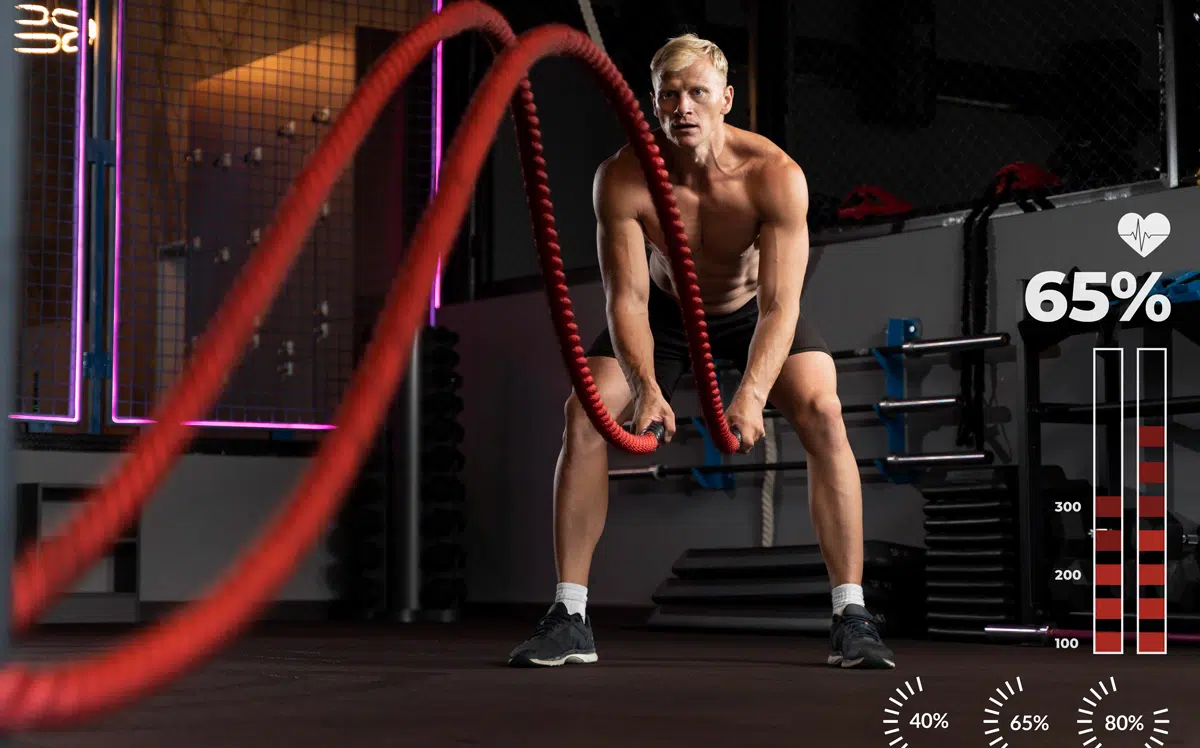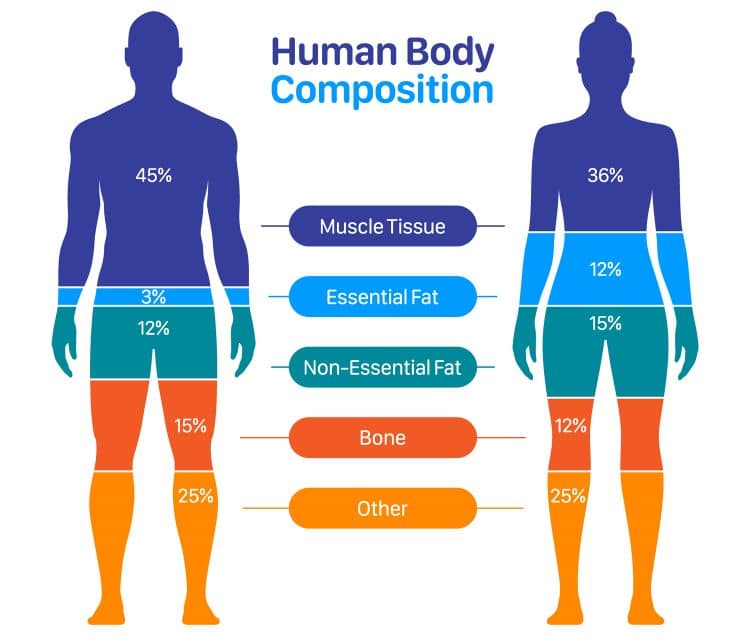When most people hear the word ‘cardio,’ they instantly think about endless hours on the treadmill. The sad part is that many of these folks cannot see an improvement in their physique, even after months of hard work.
Make no mistake, your lack of progress isn’t cardio’s fault. Instead, you must review your workout programming.
Cardio is incredibly effective for keeping your weight in check, boosting energy levels, and improving and maintaining heart health.
As a personal trainer with over 17 years of hands-on experience, I have devised a list of eight considerations to assess if your cardio workouts are really paying off. By the end of this piece, you will know exactly how to structure your workouts for the maximum impact.
Without further ado, here are the eight indicators that separate the heroes from the zeroes:
1. Heart Rate Response
Understanding your heart rate response can help you tweak your workouts to better suit your training objectives. Think of your heart rate like a car’s RPM gauge. You want to be in the perfect range to maximize mileage (longevity) and get to your destination in time.
Let’s talk about two heart rate zones that represent different intensity levels during your workout:
- Moderate Intensity (50-70% of your Maximum Heart Rate [MHR]): Experts consider this the fat-burning zone. Activities like brisk walking or a light jog can put you in this zone. You should be able to hold a regular conversation during this type of workout.
- Vigorous Intensity (70-85% of your MHR): Running, swimming laps, and high-intensity cycling can put you in this zone. As you might have guessed, you won’t be able to talk to your buddy normally during these workouts.
How To Calculate Your Target Heart Rate
Now that you understand moderate and vigorous intensity workouts, you must learn how to calculate your maximum heart rate. The easiest way is to deduct your age from 220. For instance, if you are 40, your estimated MHR will be 180 beats per minute (bpm). (1)
The moderate-intensity target heart rate for a 40-year-old would be between 90 bpm and 126 bpm, whereas the vigorous-intensity workout would involve a heart rate between 126 bpm and 153 bpm.
How To Monitor Your Heart Rate During Exercise
Place your index and middle finger on your wrist or neck and count the beats for 15 seconds. Then, multiply the number by four to get your heart rate. However, you likely won’t do this in the middle of a workout.
This is where heart rate monitors shine.
The heart rate sensors in smartwatches are accurate enough to determine your training intensity during a HIIT workout. That said, chest straps are the most accurate gadget for this, in my opinion.
These tools, combined with phone apps, can also help you track your calorie expenditure and physical exertion.
Your heart rate should rise steadily as you increase your training intensity and recover efficiently during the rest period. You should also be able to maintain your target heart rate zone for the desired duration.
An erratic heart rate indicates that you are pushing too hard or have underlying health issues.
2. Body Composition Changes
Most people who are doing regular cardio are mainly aiming for weight loss.
Your cardio workout should contribute to your fat loss objectives. If you do not see a change in your body fat percentage even after weeks of dedicated training, it is a sign that you are doing something wrong.
Even when your cardio workouts are completely dialed in, you might not see the desired results.
But why is that?
Exercise is just one part of the puzzle. A calorie deficit is the holy grail of weight loss, meaning you must expend more calories in a day than you consume to lose weight.
Most experts recommend tracking your body fat percentage via calipers or even a DEXA scan, waist circumference, and progress photos to assess your body composition progress.
Beginners should get an expert’s help to design an effective exercise and nutrition program to shorten the learning curve and speed up their improvements.
3. Recovery Time
Your recovery efficiency tells you a lot about your overall health, fitness levels, and training intensity.
Simply put, your recovery time tells you how long your body takes to relax and return to its normal state after crushing a workout.
As an example, how long does it take for you to be breathing normally again after going full-send in a 100-meter sprint?
The fitter you are, the faster your body will be back to normal again. This is because your heart, lungs, and muscles become super efficient at using oxygen, clearing out waste products from the muscle tissues, and replenishing energy stores.
How To Measure Recovery
This can be tricky as there can be various factors involved. You could use a heart rate monitor to track your heart rate immediately after a cardio session. Check on the stats every two minutes and track the heart rate decline. Subtract the second number from the first. A higher number, meaning a bigger drop, generally means better fitness.
You must also monitor your muscle soreness levels. If you are always sore after an intense cardio workout, it could signal that although your workouts are on point, your body needs more time to recover optimally.
Finally, one of the best signs of optimal recovery is that you should feel energized 10 minutes after an intense cardio workout. If you’re feeling drained, you are not doing it right.
Coach Tip: Prioritize cooling down after a workout, drink plenty of fluids to replenish the lost water and electrolytes, sleep for eight hours each night, and focus on a balanced diet to maximize recovery.
4. Performance Improvement
If you are doing everything right in your cardio routine, you will undoubtedly see improvements in your overall performance, including workouts, sports, and daily functioning.
This is how to spot these improvements:
- Endurance and stamina: You will be able to sustain your workout at higher intensities for longer. Expect an overall improvement in your productivity as your endurance improves.
- Speed: Following structured cardio workouts can improve your pace and speed, enhancing your training efficiency and results.
- Strength: This might sound counterintuitive, but effective cardio sessions can boost your strength levels as a strong heart pumps blood more effectively, resulting in better lifts.
Maintaining a training journal and logging all your workouts is a tried and tested way of tracking your progress and improvements.
Progressive Overload
Whether you are trying to gain muscle or improve your cardiovascular endurance, progressive overload holds the key to success. It includes gradually increasing the training volume, intensity, or frequency to ensure consistent progress.
5. Perceived Exertion
How you feel during a workout can be a telltale sign of its effectiveness.
The Borg Rating of Perceived Exertion (RPE) scale is the most popular and reliable tool for assessing your training intensity. It ranges from six to 20, with six being no exertion at all, meaning that you are barely breaking a sweat, and 20 indicating that you are operating at your maximal capacity, like sprinting for your life.
Monitoring your RPE during your workout can be an effective way to assess the effectiveness of your cardio session. If you are constantly hitting your RPE targets, this indicates that you are moving in the right direction.
How is RPE Different From Heart Rate
Your heart rate can be influenced by various factors like stress, caffeine, and certain medications. On the other hand, perceived exertion is an objective view of your body’s response to your training session. It includes everything from your heart rate to muscle fatigue.
Nonetheless, you must combine RPE with your heart rate tracking to get a holistic view of your training progress.
6. Energy Levels
Your energy levels after a cardio workout can be a telltale sign of the effectiveness of your routine.
Are you energized to tackle the world head-on after a workout, or are you dragging your feet for the rest of the day?
Ideally, regular cardio training should unlock your body’s energy reserve. Optimal cardio training improves your cardiovascular system’s efficiency, improving your heart and lung performance. It helps maximize oxygen delivery to the muscles and brain.
Many of my clients report feeling better after a cardio workout. This is no coincidence. Cardio training triggers the release of endorphins — feel-good hormones. This results in an elevated mood and can help combat fatigue and boost energy levels.
This is also a perfect segue into:
7. Mood Enhancement
You might enter a training session feeling tense and depressed, but you never walk out feeling less than a million dollars.
I like to think of cardio training as a natural antidepressant, minus the side effects. This is how it works:
- Endorphin rush: As explained above, cardio training increases your heart rate, which signals your brain to release endorphins. These magical chemicals make you feel happier and more relaxed.
- Stress reduction: Cardio training can lower cortisol levels, helping melt away your worries. (2)
- Anxiety relief: Physical exercise increases the blood flow to the brain, aiding in regulating your emotions and reducing anxious feelings. (3)
- Improved sleep: A better night’s sleep is one of the most underrated benefits of cardio training. It can regulate your sleep cycle, leading to a more restful and restorative sleep.
If you don’t end your workout feeling relaxed and happier, you must step back and reevaluate your entire approach.
I must add that making your cardio workouts more enjoyable plays a crucial role in improving your mood. For instance, if you don’t like running on a treadmill, you don’t have to do it. Instead, opt for swimming, dancing, or any other activity you enjoy.
8. Effort Level vs. Results
This is a very simple concept, really. Since we are putting in the work, it won’t be wrong for us to expect the results.
That said, it is not so straightforward when it comes to cardio training.
Your results must match your training intensity to justify the time and effort. Let’s break this down:
Easy Workouts, Big Gains
Whenever you start a new training routine, you will likely notice quick results. Now, this might sound awesome, but this is actually a sign that your initial fitness levels were very low.
Don’t make the mistake of stepping off the gas and being satisfied with your current routine. You must gradually increase your training intensity to ensure consistent progress.
Working Hard, Stuck In a Rut
On the flip side, you might be pushing yourself to the limit, sweating buckets, while still being stuck in a rut. Use this as an opportunity to switch up your workout programming and shock your muscles with new stimulation.
I highly recommend maintaining a training log where you note down your RPE to assess your training efforts and results. You must also be honest with yourself. Don’t give yourself an 8 RPE if the workout was really a six.
Adjust your workouts every few weeks according to your progress and goals.
Conclusion
Now that you know about the eight key indicators to ensure an effective cardio routine, pick the one that you can make a part of your lifestyle. Gradually add more indicators as you gain more experience and get comfortable.
Learn to listen to your body. If something feels weird or unnatural, stop your workout immediately and consult your healthcare provider. You must also recognize these are just guidelines. Actively monitor your health and fitness to ensure you are at the top of your game.
Finally, stay consistent, disciplined, and persistent to achieve your desired results. The progress might feel slow initially, but it will compound in the long term.
If you have any questions about the eight techniques explained in this article or need help fine-tuning your cardio routine, post them in the comments below, and I’ll be happy to help!
References:
- Kyral AM, Shipherd AM, Hearon CM. The Effect of Moderate Intensity Aerobic Exercise on Affect and Exercise Intention in Active and Inactive College Students. Int J Exerc Sci. 2019 Aug 1;12(5):1070-1079. PMID: 31523353; PMCID: PMC6719814.
- Hill EE, Zack E, Battaglini C, Viru M, Viru A, Hackney AC. Exercise and circulating cortisol levels: the intensity threshold effect. J Endocrinol Invest. 2008 Jul;31(7):587-91. doi: 10.1007/BF03345606. PMID: 18787373.
- DeBoer LB, Powers MB, Utschig AC, Otto MW, Smits JA. Exploring exercise as an avenue for the treatment of anxiety disorders. Expert Rev Neurother. 2012 Aug;12(8):1011-22. doi: 10.1586/ern.12.73. PMID: 23002943; PMCID: PMC3501262.
Tip: If you're signed in to Google, tap Follow.

















